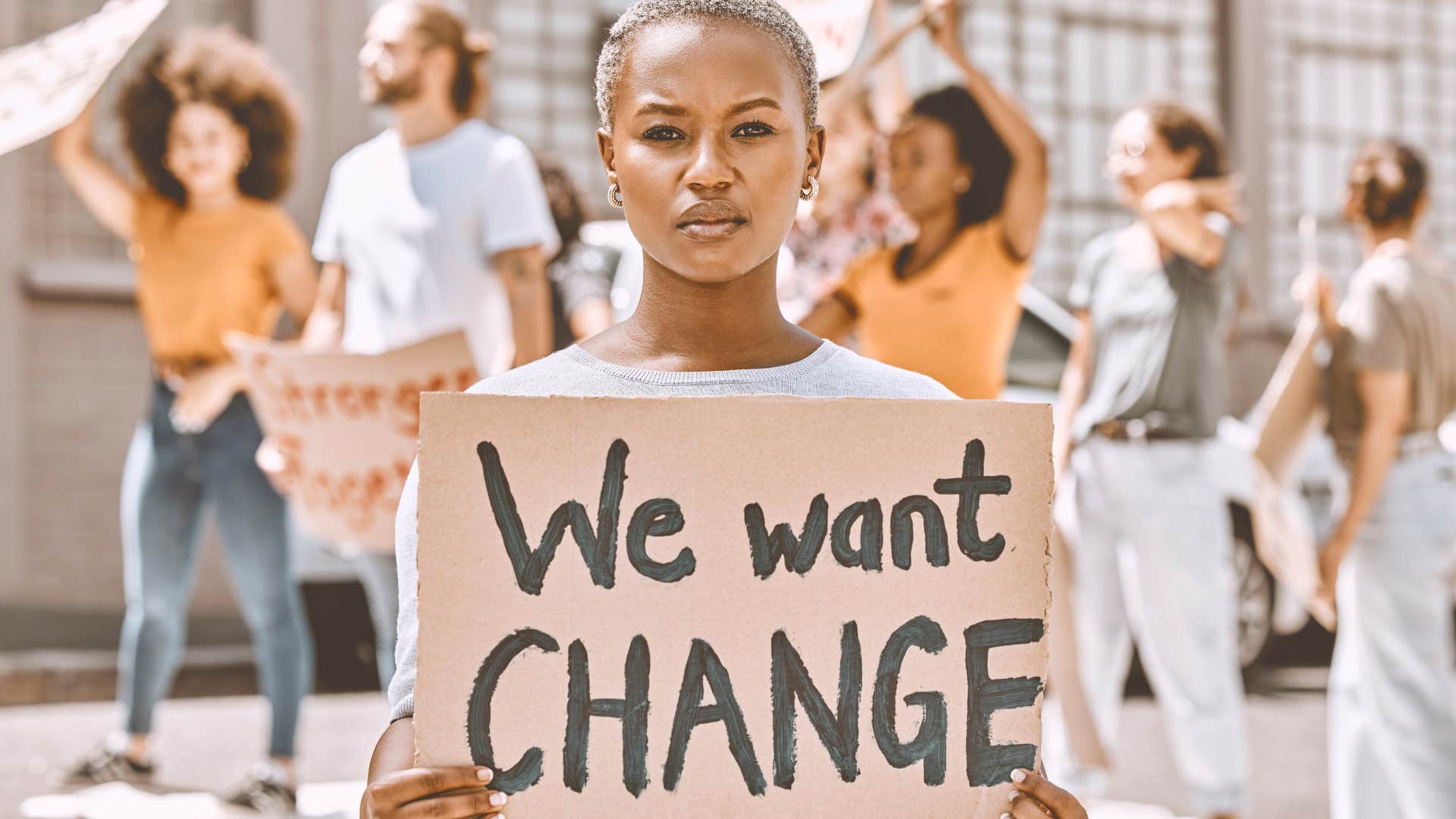8 Lessons Gen Z Learned Growing Up That Actually Make Them Tougher Than Other Generations
Gen Z are more resilient than people give them credit for.
 MAYA LAB | Shutterstock
MAYA LAB | Shutterstock As a millennial, I grew up feeling unique and distinct from others, but Generation Z has truly caught my attention. I've noticed things about Generation Z that I admire, and I find myself wishing I had learned these lessons during my early twenties. Their resilience, adaptability, and awareness of important issues like mental health, social justice, and the environment are truly inspiring.
While many of the challenges they face began in my generation, Gen Z has experienced them in a much more intensified way, and they’ve developed valuable strategies for navigating and overcoming these struggles. I am learning from them and applying those lessons to my own life.
Here are the 8 lessons Gen Z learned growing up that make them tougher than other generations:
1. Mastering digital literacy
 Ground Picture | Shutterstock
Ground Picture | Shutterstock
We’re undeniably living in a digital world. As a millennial, I remember when it all started — seeing Myspace quickly overtaken by Facebook alongside the rise of the internet and smartphones. I begged my mom for a smartphone and an online profile, only to get them much later than most millennials. Today, owning smartphones and having social media profiles is the norm for Gen Z.
A 2018 study found that 45% of Gen Z adolescents are online almost constantly. They maintain relationships via social media and have grown up in a tech-savvy environment where digital literacy is widely taught in schools.
Beyond formal education, Gen Z also self-educates through online resources. A 2017 study by the Center for Generational Kinetics found that 85% of Gen Z had watched at least one online video in the past week to learn a new skill. Gen Z has mastered digital literacy from a young age, and that is a skill.
2. Handling social media pressure
 progressman | Shutterstock
progressman | Shutterstock
Gen Z is quick to establish and maintain an online presence, as Jon Stewart highlighted on "The Daily Show," saying, “I’ve never had a more heard generation. I can’t get them off my phone.”
While being heard shows courage, it also brings challenges. A report from NBC News revealed that Gen Z's anxiety levels surrounding social media are three times higher than their parents'. They navigate the dangers of cancel culture, feeling pressure to say just the right thing.
According to the McKinsey Health Institute, this constant online engagement and the challenges it brings have made Gen Z more resilient to social media pressure, preparing them and future generations for the growing online challenges ahead.
3. Prioritizing mental health
 VH-studio | Shutterstock
VH-studio | Shutterstock
Given the pressures of social media and online platforms, it’s no surprise that mental health has become a priority for this generation.
Despite the ongoing stigma surrounding mental health, Gen Zers openly discuss their struggles, actively seek professional help, and place a strong emphasis on mental well-being.
According to a February 2022 Ogilvy study, 70% of Gen Zers say their mental health is a top priority. Additionally, an American Psychological Association report also found that Gen Z is more likely to report mental health concerns than any other demographic, proving that these young people are comfortable acknowledging struggles and seeking help when they need it.
4. Importance of activism
 PeopleImages.com - Yuri A | Shutterstock
PeopleImages.com - Yuri A | Shutterstock
Who would have thought that school would be frightening beyond typical concerns like bullying and academic stress? Gen Z lived through the trauma of Columbine and the school violence that has since followed.
It has deeply impacted their mental health, but has also given them a cause to be passionate about.
Many young people have become vocal activists for reform, using protests, social media, and their age to drive change and engage others in the conversation, according to CNBC.
5. Political Polarization
 AYO Production | Shutterstock
AYO Production | Shutterstock
With rising online disagreements, division, and clashes between political ideologies, Gen Z is inheriting a divisive political climate. According to Carolina Hohagen and Juan Diego Solis de Ovando Bitar from Global Americans, many in Gen Z feel hopeless and disillusioned, particularly about the future.
Like young millennials, Gen Z is becoming a key demographic in American politics. Gen Z is increasingly dissatisfied with traditional political parties. This was clearly seen during the 2024 presidential election, as data indicated that Gen Z was increasingly dissatisfied with both candidate options as the election neared, with many foregoing voting altogether.
As these younger people become more active participants in the political process and begin running for office themselves, they have the opportunity to effect real change in what many consider a divided nation.
6. Navigating economic uncertainty
 fizkes | Shutterstock
fizkes | Shutterstock
Times are tough, and it’s frightening to realize that even with a college degree, job security and the ability to pay off student loan debt are not guaranteed. These financial challenges are a major source of stress, anxiety, and uncertainty for Gen Z, but they are also issues that they grew up with, making them more resilient in the face of the struggles.
The EY 2023 Gen Z Segmentation Study found that over 50% of Gen Z respondents, aged 16-26, are "extremely worried about not having enough money." This reflects their concerns about the economy, potential recession, and the rise of AI, making financial stability a top priority.
At the same time, however, they prioritize quality of life over a hustle culture mentality and make mental health and wellness an important part of everyday life. Basically, they've grown up knowing that financial stability would not be a certainty. Still, they aren't willing to let go of their core beliefs that center around finding joy in life outside of work, making them tougher than other generations.
7. Prioritizing green intitiatives
 Liv Oeian | Shutterstock
Liv Oeian | Shutterstock
Greta Thunberg, one of Gen Z’s leading environmental activists, stands in sharp contrast to many older generations who don't prioritize climate change advocacy or, in many cases, doubt its existence and significance.
Today, concerns about the environment are rising, particularly as we experience extreme weather events like wildfires and droughts. The visible damage humans are causing to the Earth has led to growing fears about its survival.
An Australian study reveals that over 80% of Gen Z are concerned about climate change, which impacts their mental health and life decisions, such as career and family planning.
Gen Z is actively confronting climate change and its potential consequences by making life choices based on the health of our environment. They are much tougher than other generations because they refuse to stick their heads in the sand and pretend the problems don't exist.
8. Embracing an entrepreneurial spirit
 PeopleImages.com - Yuri A | Shutterstock
PeopleImages.com - Yuri A | Shutterstock
With growing concerns about the economy, it's no surprise that Gen Z has developed a strong entrepreneurial spirit. From tarot readers and astrologers to book and movie reviewers, vintage sellers, and DIY content creators, Gen Z channels their creativity into building businesses.
They're determined to follow their passions, whether it leads to financial success or not, often pursuing side hustles or serious hobbies with dedication and enthusiasm.
Gen Z is quickly gaining a reputation as one of the most entrepreneurial generations. A New Square report reveals that 84% plan to own a business within the next five years, despite 72% feeling that the economy has been tougher for them than previous generations. Around 45% of Gen Zers have used their savings to get started and 80% have launched their businesses online.
We can learn a lot from Gen Z as we move forward. While they may seem overly dependent on social media and fragile without it, don’t be fooled — they’re resilient and ready to make an impact. Each generation has its lessons to learn, but that doesn’t mean we should overlook Gen Z's experiences.
Mina Rose Morales is a writer and photojournalist with a degree in journalism. She covers a wide range of topics, including psychology, self-help, relationships, and the human experience.

